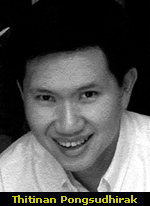If the Thai prime minister adopted a more principled stance on Burma, it would improve Thailand’s image
 His critics and detractors notwithstanding, Prime Minister Thaksin Shinawatra can not be accused of passivity. He is famously bold and pro-active in his domestic dealings, having monopolized Thailand’s political space with virtual authoritarian rule, and implemented a raft of populist policies that have earned him an unprecedented second term for an elected leader. What Thaksin has done at home has been mirrored by his foreign policy activism. The Thai leader has devised a foreign policy platform that revolves around a clutch of regional initiatives, underpinned by the Asia Cooperation Dialogue, the Ayeyarwady-Chao Phraya-Mekong Economic Cooperation Strategy and a series of strategic bilateral free-trade agreements. His audacity in past foreign relations included his swift military response to the arson and looting of the Thai embassy in Phnom Penh in January 2003. Thaksin’s assertive-ness can also be seen in his defiance of past human rights criticisms by the UN and the US State Department. “The UN,” he once blustered, “is not my father.”
His critics and detractors notwithstanding, Prime Minister Thaksin Shinawatra can not be accused of passivity. He is famously bold and pro-active in his domestic dealings, having monopolized Thailand’s political space with virtual authoritarian rule, and implemented a raft of populist policies that have earned him an unprecedented second term for an elected leader. What Thaksin has done at home has been mirrored by his foreign policy activism. The Thai leader has devised a foreign policy platform that revolves around a clutch of regional initiatives, underpinned by the Asia Cooperation Dialogue, the Ayeyarwady-Chao Phraya-Mekong Economic Cooperation Strategy and a series of strategic bilateral free-trade agreements. His audacity in past foreign relations included his swift military response to the arson and looting of the Thai embassy in Phnom Penh in January 2003. Thaksin’s assertive-ness can also be seen in his defiance of past human rights criticisms by the UN and the US State Department. “The UN,” he once blustered, “is not my father.”
Yet when it comes to Thailand’s relations with Burma—an issue on which Thaksin’s centralized and personalized foreign policy platform pivots—the self-styled “CEO Prime Minister” has been conspicuously timid. Thailand’s Burma policy under Thaksin has been characterized by accommodation and appeasement, at times bordering on flattery. It has rendered “constructive engagement” completely elastic in accordance with the preferences of the State Peace and Development Council, Burma’s ruling military regime. Whatever the SPDC wants, the Thaksin government seems willing to comply. For a nationalist leader who has told off the UN and the US, Thaksin has uncharacteristically kowtowed to the SPDC’s whims, letting Bangkok play second fiddle to Rangoon.
When the SPDC snubbed Thailand’s roadmap for domestic political reconciliation and reform early last year and came up with its own seven-point roadmap, the Thaksin government’s lame excuse was that its initiative was set up to “show a way forward” for the junta. When Gen Khin Nyunt, the former Burmese prime minister, was purged from the SPDC’s hierarchy in October 2004, the Thaksin government readily accepted its counterpart’s official explanation of corruption and graft. Gen Khin Nyunt’s downfall, in fact, bankrupted Thaksin’s hitherto bilateral relationship with Burma, which centered on cordial ties between the respective leaders of both countries. As Thaksin had invested substantial diplomatic energy and resources in cultivating ties with Khin Nyunt, the latter’s demise was disastrous for Thailand’s Burma policy. It also exposed the myopia and fundamental flaws of Thaksin’s personalized diplomacy.
 His critics and detractors notwithstanding, Prime Minister Thaksin Shinawatra can not be accused of passivity. He is famously bold and pro-active in his domestic dealings, having monopolized
His critics and detractors notwithstanding, Prime Minister Thaksin Shinawatra can not be accused of passivity. He is famously bold and pro-active in his domestic dealings, having monopolized 